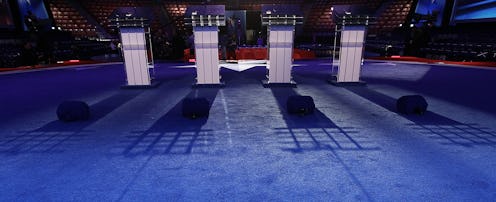News
You'll Need To Clear Plans For 2 Nights To Watch All The Democratic Candidates Debate

The 2020 presidential primary will kick into high gear with the race's first Democratic debate. But don't expect the opening verbal tussle between candidates to look anything like the party's previous debates. Thanks to a jam-packed roster of candidates, the first 2020 Democratic debate will take two nights to complete.
The crowded field of 2020 Democratic presidential challengers has forced the Democratic National Committee (DNC) to rethink its primary debates. Rather than try to squeeze all 24 candidates onto one debate stage, the DNC has opted to split qualifying candidates into two groups and host back-to-back debates to accommodate them all, according to Politico. This first Democratic presidential primary debate is scheduled to take place in Miami, Florida, on June 26 and 27.
Of course, not all of the party's 2020 candidates will get to hash out their ideas on the debate stage. To qualify, Politico has reported a candidate needs to have met one of two thresholds set by the DNC: secure 1% of support in three DNC-approved polls, or garner donations from at least 65,000 people with at least 200 of those donors spread across 20 different states. The deadline to meet at least one threshold and qualify for the debate was June 12, according to USA Today.
Only 20 Democratic candidates will participate in the party's upcoming debate. Those 20 candidates will be randomly divided into two groups of 10, with one group of candidates taking the debate stage on night one, followed by the second group on night two, as Politico notes. Should more than 20 candidates end up qualifying, the Hill has reported that those who met both the polling and fundraising thresholds will be given priority while the remaining hopefuls are decided with tiebreakers.
Thirteen of the 24 Democratic 2020 candidates had already met the DNC's polling and fundraising thresholds in early June, virtually guaranteeing them spots in the party's first primary debate, per Politico. They include former Vice President Joe Biden, Sen. Cory Booker, Mayor Pete Buttigieg, Julián Castro, Tulsi Gabbard, Sen. Kamala Harris, Gov. Jay Inslee, Sen. Amy Klobuchar, former Rep. Beto O’Rourke, Sen. Bernie Sanders, Sen. Elizabeth Warren, spiritual guru Marianne Williamson, and tech entrepreneur Andrew Yang. Sen. Michael Bennet, Mayor Bill de Blasio, John Delaney, Sen. Kirsten Gillibrand, John Hickenlooper, Rep. Tim Ryan, and Rep. Eric Swalwell are all reported by Politico to have met the DNC's polling threshold. Gov. Steve Bullock, Mayor Wayne Messam, and Rep. Seth Moulton, however, have not yet met any of the thresholds required for participation in the debate, according to Newsweek. It is unclear if former Alaska Sen. Mike Gravel had met the qualification threshold.
DNC Chairman Tom Perez told CNN the party had changed its debate qualifications to include what he called "a grassroots fundraising criteria" because it wanted to "reward campaigns that are investing in the grass roots." He claimed the committee's decision to randomize how candidates are grouped for the debate would give lesser known candidates the opportunity to "breakthrough."
"My goal is to make sure that all of those candidates and their supporters feel like they got a fair shake so that next spring when we have our nominee, they can hit the ground running," he said, per USA Today. The DNC told the news outlet it planned to up the polling and fundraising thresholds required for participation in debates scheduled for September and October, forcing candidates to garner 2% in four approved polls and at least 130,000 individual donors.